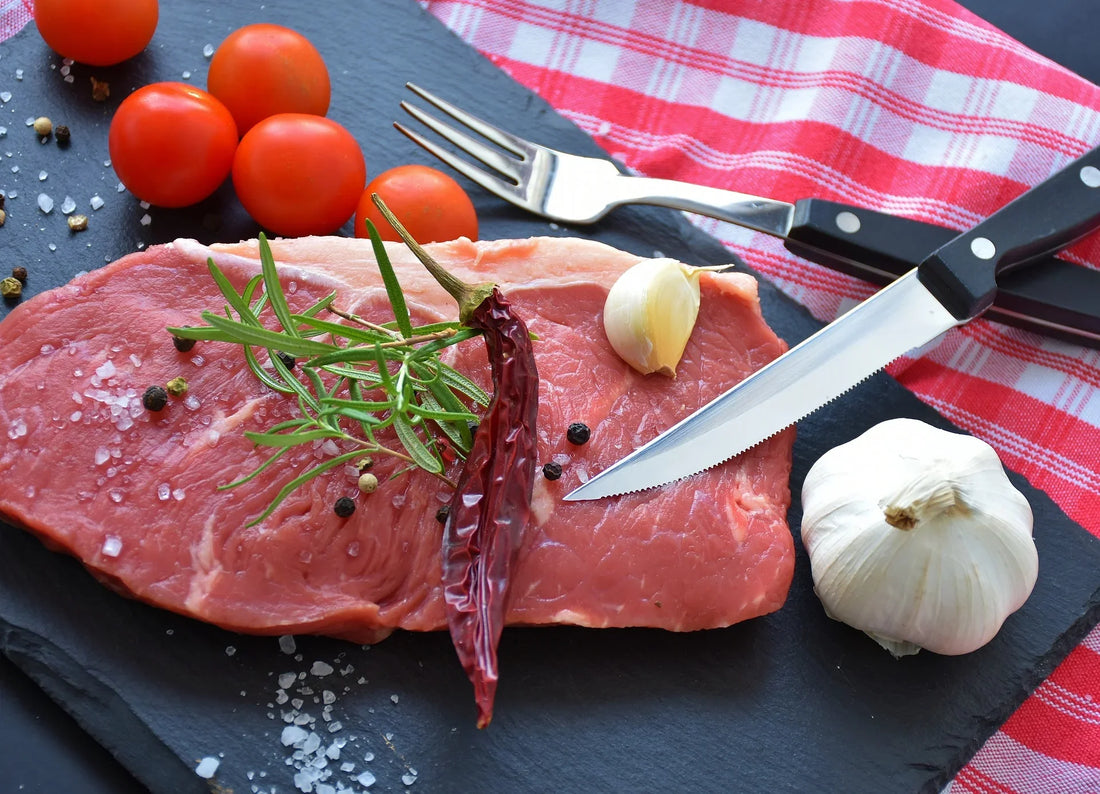Beef has a cold and dry temperament and is highly melancholic and harmful. It increases black bile in the body.
The Temperament of Beef
Beef has a cold and dry temperament, significantly leading to an increase in black bile in the body and is highly melancholic and harmful. Darkening of the skin, depression, obsessive-compulsive disorder, varicose veins, spleen enlargement, and intestinal diseases occur due to the increased black bile in the body, and excessive consumption of veal exacerbates these conditions. This meat leads to blood thickening and is not suitable for the liver.
Ready-made meat products such as Sausages and Salami and Lunch meats are often made from beef, so their consumption is not recommended.

Disadvantages of beef
Avicenna associated the consumption of "beef and veal" with 16 deadly diseases, the first of which is cancer, the second Melancholia (Schizophrenia), and the third is Hemorrhoids. Beef significantly increases black bile in the body, it causes blood thickening, and imposes a heavy burden on the liver. The consumption of beef and veal is a cause of sudden deaths due to blockage and the ascent of thick vapors towards the heart and brain.
1. It causes cellular diseases
Beef is considered toxic; it contains a high amount of urea, which is a metabolic byproduct of protein. Urea, a toxic substance, is formed as a result of protein consumption. Proteins in the body act as structural components rather than being used as fuel. For this reason, the excessive consumption of protein is not endorsed. Most of our foods should consist of carbohydrates and fats with minimal protein content because excessive protein intake shortens lifespan and leads to cellular diseases. Physicians advise patients with gout to avoid consuming red meat. We have various types of red meat, such as lamb and camel meat, which should be alternatives to beef. Among red meats, the best for consumption is lamb meat, characterized by a warm, moist, and moderate temperament. The preferred method of meat consumption is stewing.
2. Beef can cause allergies in the body
If substances like hormones, or antibiotics, are added to veal, it can cause allergies or health disorders, especially in children. According to Traditional Medicine, veal has a cold temperament. For this reason, it is recommended that pregnant mothers avoid its excessive consumption. Instead, it is advised to use local one-year-old veal, young camel meat, young male sheep, one-year-old lamb, goat kid, turkey, quail, partridge, ostrich, local chicken and rooster instead of beef.
3. May Lead to Gout and Kidney Stones
Regular consumption of beef may affect your joints and kidneys. When you consume animal protein, especially red meat, the uric acid level in your body increases. The accumulation of uric acid in the bloodstream can lead to the formation of crystals in the joints (gout) and combine into uric acid stones in the kidneys, both of which are very painful conditions.
The connection between animal protein and kidney stones has been well documented. In a study, it was shown that men who consumed the equivalent of more than 4 ounces of beef daily experienced up to a 48% increase in blood uric acid levels and a 250% higher likelihood of developing kidney stones. The World Cancer Research Fund recommends limiting the intake of unprocessed red meat to approximately three servings (12 to 18 ounces) per week for maintaining health.
4. It Could Lead to Your Destruction
Numerous studies have shown the correlation between consuming red meat and an increased risk of chronic diseases and mortality. For example, a large study analyzed health and lifestyle data from over 120,000 men and women for more than 20 years. The published results indicated a 12% higher overall mortality risk for individuals consuming one serving of red meat per day and a 20% higher risk for those consuming processed red meat.
It's noteworthy that researchers pointed out individuals consuming more red meat tended to have lower intake of fruits, vegetables, and whole grains. They also exhibited less physical activity and had higher body mass index. However, another study in a population known for a very healthy lifestyle and minimal red meat consumption associated mortality (for any cause) with lower red meat consumption. Published in 2019, this study analyzed data from a group of Christians who typically followed a whole-foods plant-based diet, abstained from alcohol, and restricted animal products. When compared to participants who reported no red meat consumption, this Christian group, reporting low to moderate red meat intake (about half a serving per day), showed an elevated risk of overall mortality and deaths due to cardiovascular diseases.
Diets high in saturated fats are indeed linked to increased risk, especially for leading causes of death, such as heart diseases.

The appropriate amount of consumption of beef and lamb
Currently, camel meat is recommended for many overweight patients. Camel meat is nutritious, especially when it's from a young camel, as it provides significant warmth and can contribute to strengthening the heart and immune system. Additionally, camel meat has a calming effect on people.
A key factor that has gained lamb meat many enthusiasts is its cancer-preventive properties. The presence of resources such as iron, choline, and selenium help prevent attacks that lead to cancer. Additionally, lamb meat contains linoleic acid, which contributes to preventing cancer-related inflammations and malignant tumors.
✓ Important Note
Indeed, a crucial point in the consumption of beef, camel, and lamb meat is to use them in moderation. It is recommended to consume red meat a maximum of two times per week, and it's better to meet the body's protein needs through sources like white meat or plant-based foods such as beans and other legumes.
Nevertheless, it should be considered that the difference between beef and lamb in terms of fat content is not substantial, and both contain a significant amount of fat and cholesterol. Excessive consumption of these not only has no benefits but can also lead to cardiovascular diseases, high blood fat, and contribute to the development and progression of other diseases such as diabetes. When consuming them, try to focus on leaner cuts such as sirloin, shank, and arm, which have less fat compared to other parts.
Moderate consumption of meat poses no problem for humans, but frequent intake can result in increased cholesterol, elevated uric acid, gout, and various joint diseases.
Due to the cold temperament of veal, its consumption by individuals with a cold temperament can lead to issues such as weakness and bone pain. Therefore, caution is advised for these individuals. Consumption of veal is not recommended for those with digestive issues such as stomach bloating. Additionally, individuals with epilepsy or neurological disorders should avoid eating veal.
Joint and muscle pain and the consequences of rheumatoid arthritis tend to worsen due to consuming veal. Consequently, elderly individuals should refrain from including veal in their meals.




